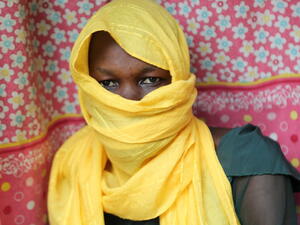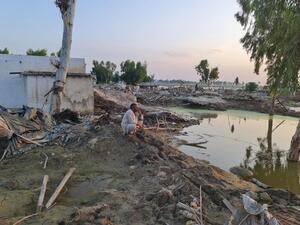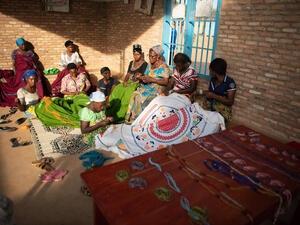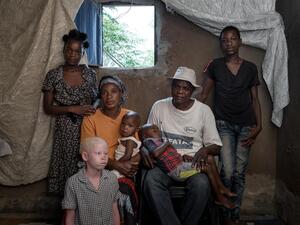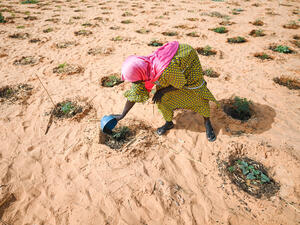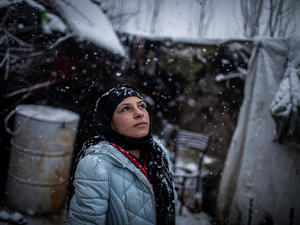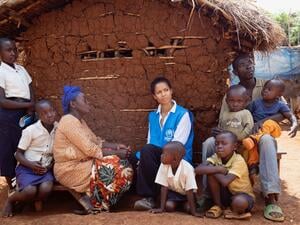As COVID-19 and conflict surge, DR Congo displaced face deadly consequences of chronic underfunding
As COVID-19 and conflict surge, DR Congo displaced face deadly consequences of chronic underfunding

A South Sudanese refugee and child pictured in Bele settlement, Haut Uele province, the Democratic Republic of the Congo.
Massive funding gaps are threatening hundreds of thousands of lives in the Democratic Republic of the Congo, where surging violence and COVID-19 are exacerbating already dire conditions for millions of forcibly displaced people.
As of June 7, DRC has recorded 4,105 confirmed cases of COVID-19 – the second largest number in the Southern Africa region. At the same time, surging violence is uprooting hundreds of thousand more people in the east of the country.
UNHCR, the UN Refugee Agency, is warning that without an urgent injection of cash, underfunding will have a devastating impact on critical lifesaving humanitarian programmes. Our activities to assist and protect the refugees and the displaced are only 20 per cent funded of the US$168 million needed.
This gap is seriously undermining our response to bring aid to the multiple humanitarian emergencies, leaving many vulnerable without food, water, shelter, health and hygiene facilities amid a rapid spread of COVID-19 across the country.
People uprooted in DR Congo by repeated cycles of conflict, represent Africa’s largest internal displacement situation – 10 per cent of the global numbers of internally displaced people. Over the past few months, hundreds of thousands more people have been displaced in eastern and northern DRC following brutal attacks by various armed groups, intercommunal violence and natural disasters.
The country also hosts over half a million refugees – mainly from Rwanda, Burundi, the Central African Republic (CAR), and South Sudan.
While the overall humanitarian situation remains alarming, UNHCR is forced to make difficult choices that result in many of those in dire need not getting the assistance they require. We are working to help the most vulnerable to the extent possible, minimum standards in health, water and sanitation, education and other basic needs are often hard to meet with limited resources available for all populations.
Among those affected are Rwandan refugees, who had been living in communities now displaced by successive waves of violence in North and South Kivu. The lack of funding also hampers efforts towards finding lasting solutions for these refugees, for whom the Congolese Government indicated an openness to facilitating long stay permits and local integration.
In South Ubangi’s Mole refugee camp, additional resources are needed to ensure that 15,000 refugees from CAR have access to the minimum water requirement of 20 litres per person per day. This is particularly important now, when, in addition to the COVID-19 pandemic, refugees and their hosts communities need potable water to protect them against endemic cholera and what is now the world’s longest running measles crisis.
Current available funding also limits UNHCR’s interventions to support the 120,000 refugees from the CAR living outside of camps, who constitute about 70 per cent of refugees from CAR in the DRC.
The education gap for 6,000 South Sudanese refugees of secondary age is also increasing. A staggering 92 per cent of them still do not go to school. While UNHCR started a small programme to enrol refugees in secondary school, additional funding is needed to help construct and refurbish school buildings serving both refugees and host communities.
Over 47,000 Burundian refugees might not be able to access basic health services in South Kivu. It will also impact on the self-reliance of these refugees as they have been waiting for support with agriculture activities to reduce their dependence on food rations provided by the World Food Programme (WFP).
Continued underfunding also undermines UNHCR’s shelter programmes, and specifically its work to decongest displaced sites and hosting areas. More funding is needed to provide durable housing solutions which will contribute to reduce public health risks.
The outbreak of COVID-19 further aggravates the risks faced by displaced families who are unable to return home due to the ongoing violence, and who often live in overcrowded displacement sites or with impoverished host families. Their circumstances do not allow for distancing, while there is also limited access to water, sanitation systems and health facilities.
We have just received US$ 400,000 for COVID-19 prevention measures in DRC.
For more information on this topic, please contact:
- In Kinshasa, DRC, Johannes Van Gemund, [email protected], + 243 817 0009 484
- In Kinshasa, DRC, Fabien Faivre, [email protected], + 243 825 443 419
- In Pretoria, Helene Caux, [email protected], + 27 82 376 5190
- In Geneva, Charlie Yaxley, [email protected], +41 795 808 702
- In Geneva, Babar Baloch, [email protected], +41 79 513 9549

